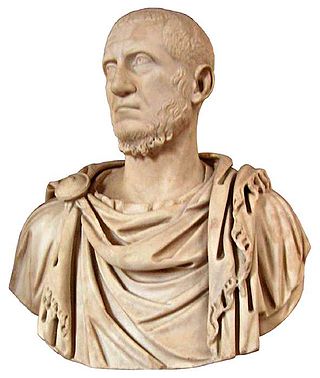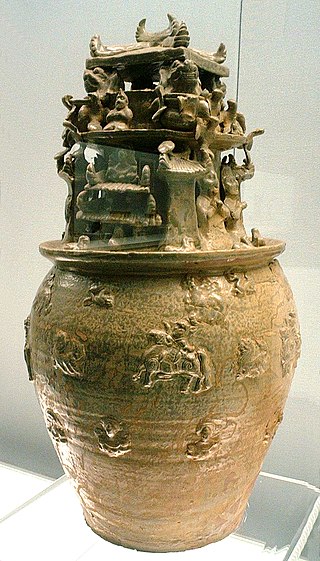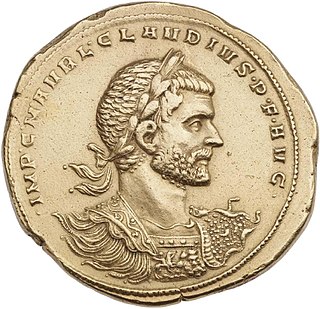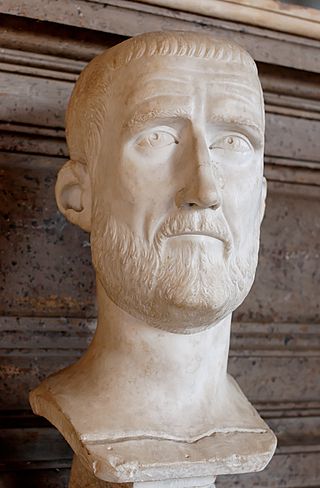
Marcus Claudius Tacitus was Roman emperor from 275 to 276. During his short reign he campaigned against the Goths and the Heruli, for which he received the title Gothicus Maximus.
The 270s decade ran from January 1, 270, to December 31, 279.

Year 271 (CCLXXI) was a common year starting on Sunday of the Julian calendar. At the time, it was known as the Year of the Consulship of Aurelianus and Bassus. The denomination 271 for this year has been used since the early medieval period, when the Anno Domini calendar era became the prevalent method in Europe for naming years.
The 230s decade ran from January 1, 230, to December 31, 239.
The 290s decade ran from January 1, 290, to December 31, 299.
The 280's decade ran from January 1, 280, to December 31, 289.

Aurelian was a Roman emperor who reigned from 270 to 275 during the Crisis of the Third Century. As emperor, he won an unprecedented series of military victories which reunited the Roman Empire after it had nearly disintegrated under the pressure of barbarian invasions and internal revolts. Born in modest circumstances, most likely in Moesia Superior, he entered the Roman army in 235 and climbed up the ranks. He went on to lead the cavalry of the emperor Gallienus, until Gallienus' assassination in 268. Following that, Claudius Gothicus became emperor until his own death in 270. Claudius' brother Quintillus then ruled for three months, before Aurelian took the empire for himself.

Year 293 (CCXCIII) was a common year starting on Sunday of the Julian calendar. In the Roman Empire, it was known as the Year of the Consulship of Diocletian and Maximian. The denomination 293 for this year has been used since the early medieval period, when the Anno Domini calendar era became the prevalent method in Europe for naming years.

Year 291 (CCXCI) was a common year starting on Thursday of the Julian calendar. At the time, it was known in Rome as the Year of the Consulship of Tiberianus and Dio. The denomination 291 for this year has been used since the early medieval period, when the Anno Domini calendar era became the prevalent method in Europe for naming years.

Year 273 (CCLXXIII) was a common year starting on Wednesday of the Julian calendar. At the time, it was known as the Year of the Consulship of Tacitus and Placidianus. The denomination 273 for this year has been used since the early medieval period, when the Anno Domini calendar era became the prevalent method in Europe for naming years. The year also saw most lost territories to rebellion returned to the Roman Empire by Emperor Aurelian.

Year 275 (CCLXXV) was a common year starting on Friday of the Julian calendar. At the time, it was known as the Year of the Consulship of Aurelianus and Marcellinus. The denomination 275 for this year has been used since the early medieval period, when the Anno Domini calendar era became the prevalent method in Europe for naming years.

Marcus Aurelius Claudius "Gothicus", also known as Claudius II, was Roman emperor from 268 to 270. During his reign he fought successfully against the Alemanni and decisively defeated the Goths at the Battle of Naissus. He died after succumbing to a "pestilence", possibly the Plague of Cyprian that had ravaged the provinces of the Empire.

Year 310 (CCCX) was a common year starting on Sunday of the Julian calendar. At the time, it was known as the Year of the Consulship of Andronicus and Probus. The denomination 310 for this year has been used since the early medieval period, when the Anno Domini calendar era became the prevalent method in Europe for naming years.

Marcus Aurelius Probus was Roman emperor from 276 to 282. Probus was an active and successful general as well as a conscientious administrator, and in his reign of six years he secured prosperity for the inner provinces while withstanding repeated invasions of barbarian tribes on almost every sector of the frontier.

Marcus Aurelius Carus was Roman emperor from 282 to 283. During his short reign, Carus fought the Germanic tribes and Sarmatians along the Danube frontier with success.

Marcus Annius Florianus, also known as Florian, was Roman emperor from the death of his half-brother, Emperor Tacitus, in July 276 until his own murder in September of that year.

Ulpia Severina was Roman empress as the wife of Roman emperor Aurelian from c. 270 to 275. Severina is unmentioned in surviving literary sources and known only from coinage and inscriptions, and as a result, very little is known about her. Her nomen Ulpia suggests that she may have been related either to Emperor Trajan or the usurper Laelianus, as they share the same nomen, and perhaps from Dacia, where the name was common. It is not known when she married Aurelian, but it might have been before he became emperor. She was probably proclaimed Augusta in the autumn of 274.

The barbarian invasions of the third century (212–305) constituted an uninterrupted period of raids within the borders of the Roman Empire, conducted for purposes of plunder and booty by armed peoples belonging to populations gravitating along the northern frontiers: Picts, Caledonians, and Saxons in Britain; the Germanic tribes of Frisii, Saxons, Franks, Alemanni, Burgundians, Marcomanni, Quadi, Lugii, Vandals, Juthungi, Gepids and Goths, the Dacian tribes of the Carpi and the Sarmatian tribes of Iazyges, Roxolani and Alans, as well as Bastarnae, Scythians, Borani and Heruli along the Rhine-Danube rivers and the Black Sea.













